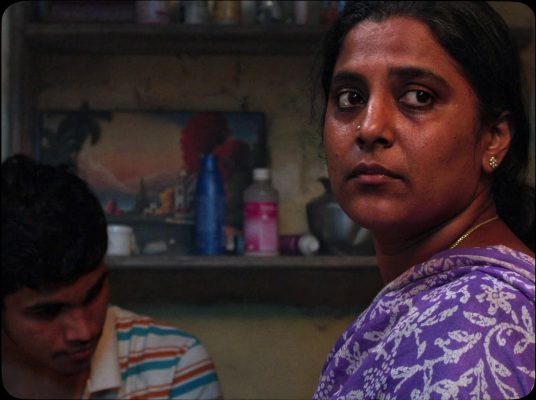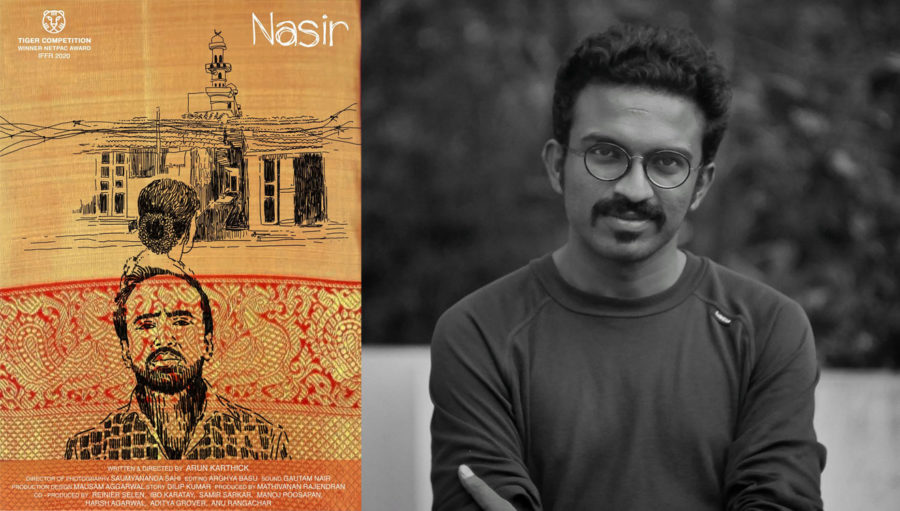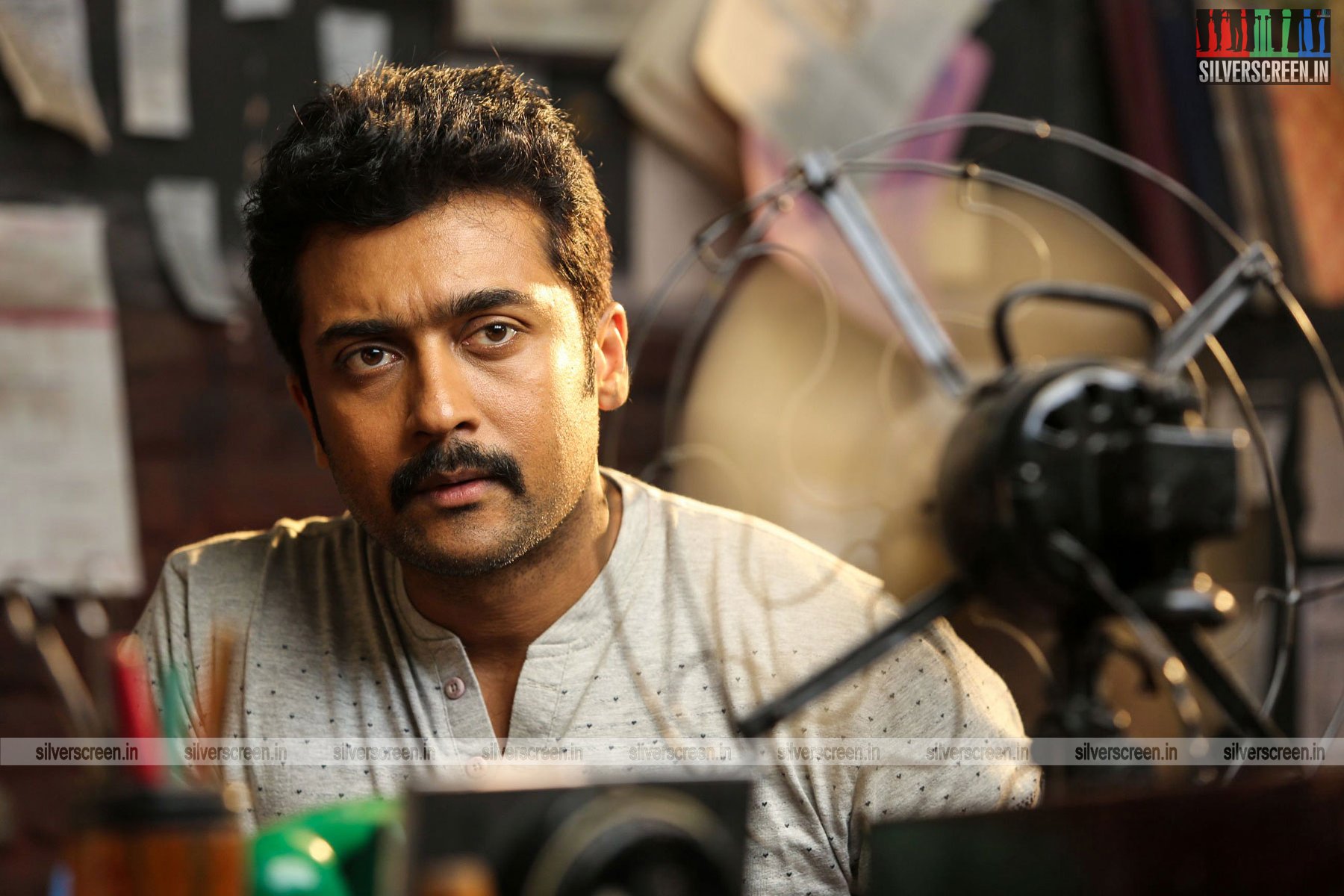Nasir, the Tamil independent feature film, directed by filmmaker Arun Karthick, recently won the Best Film award at the New York Indian Film Festival.
The film, which premiered in the International Film Festival Rotterdam (IFFR) in February 2020, follows the life of Nasir (portrayed by Koumarane Valavane), a salesman at a garment shop by profession and a poet by passion, who resides in a closely-populated Muslim neighbourhood in Coimbatore. The 79-minute-long film shows glimpses from Nasir’s life as he goes about spending time with his family, attends midday prayers, and works at the garment store, until eventually, tragedy strikes due to communalism.
Nasir is based on a short story written by Dilip Kumar titled A Clerk’s Story. Speaking about the impact the story made him, which in turn resulted in Nasir, filmmaker Arun, in conversation with Silverscreen India, says, “The story haunts you. The power of the character wouldn’t leave me for days after reading. So I told myself that I would make it someday.”
From short story to film
Arun, who was familiar with the author’s earlier works, had come across A Clerk’s Story a year before he made his debut feature film, Sivapuranam, and he says it immediately drew him.
But while he had read the story in 2013, it was in 2016 that our “social reality” made Arun revisit it. The 2016 Coimbatore Riots, he tells us, provided the impetus to make a film based on the story. “I thought it would be the right story for me to do then, given all the communal disturbances across the country. And as a filmmaker, I wanted an array of characters that the protagonist moves around. The form of the short story worked for me,” the Coimbatore-based filmmaker adds.

Arun says he identified with the protagonist, a “working-class man who by heart is easy-going and seemingly simple.” He goes on to add, “What I liked in the short story was the reflection of the world through a character whom I could relate to. I am familiar with all the locations mentioned in it. So, when I was reading this story set in Coimbatore, by a Coimbatore-based writer, I felt that I knew this man and felt outraged by what happens to him. And I wanted to express this.”
The filmmaker says he wanted to translate the “haunting” feeling he had after reading the story into a film. “The challenge of adapting a short story from the textual realm to the screen, to make it a lived reality, is what motivated me. How to recreate this story and bring it alive on screen, that was the fun of making the film,” he says.
Nasir is a straight adaptation of the short story. “I have not changed much. Of course, there are some creative liberties, but overall, I have tried to be true to the short story and retain the essence of the protagonist, along with the feeling that the story generates,” Arun explains.

Production and casting
The film was shot in the central urban spaces of Coimbatore in December 2018. Since he wanted to ensure he understood the specific setting of the story, Arun stayed in that neighbourhood for two years before he started filming. “Next to the market streets are these small concentrated pockets of Muslim communities. I stayed in one of the most volatile places with a history of communal violence. To go there and shoot the film wouldn’t have been possible without an understanding of the place and the support of the locals.”
The technicians played a huge role in bringing the locality alive in the film, he adds. “Our cinematographer Saumyananda Sahi is a keen-eyed person and his work really brought alive the colourful nature of the place. We didn’t want to show the entire world; just space around Nasir as moves through it,” says the filmmaker, also giving credit to sound designer Gautam Nair and their editor, the late Arghya Basu, for the final output.
The right cast was just as crucial in creating the world of Nasir. Even before the team held auditions in Chennai, Madurai, and Coimbatore, Arun knew “what kind of faces” he needed and looked for actors who “had the characters within them.” The filmmaker adds, “There were many newcomers, and I was okay with that. But I wanted them to have a certain presence.”

Nasir is an Indo-Dutch co-production, backed by Mathivanan Rajendran, Reinier Selen, Ibo Karatay, Manoj Poosappan, Samir Sarkar, Anu Rangachar, Aditya Grover, and Harsh Agarwal under the banners Stray Factory, Rinkel Film, Harman Ventures, Magic Hour Films, Cent Percent Films, and Uncombed Buddha.
Speaking of how this came about, Arun says, “I applied for Hubert Bals Fund at the International Film Festival Rotterdam (IFFR) for script and project development grant and we got funding of 10,000 Euros. It helped me realise that I can make the film with not just local money, but collaborate with producers worldwide. So IFFR scheduled some sessions and we pitched the story.”
“I already had my main producer Mathivanan Rajendran. Over the next year, we developed the film and were able to partner with five Indian companies and one Dutch company (Reinier Selen, Ibo Karatay of Rinkel Film). We also got a grant from Netherlands Film Fund of 50,000 Euros, which enabled us to complete the post-production in Amsterdam,” he adds.
Portraying communal violence
When asked about the handling of a sensitive topic like communal violence, and whether he was wary of treading such dangerous ground, Arun explains, “The conversations with the team were clear, especially about what we didn’t want in the film. This is not your usual political thriller. We didn’t want to have a build-up to the end. There is no antagonist versus protagonist narrative in the film nor did we pitch any groups against each other. We also steered clear of manipulative things like showing shocking violence or even showing the faces in the final scene. Instead, we had breaking points, where you observe, but are helpless as a viewer.”
The filmmaker says what he wanted to convey through Nasir is more than just a message. His focus was on the feelings and questions that the audience is left with after watching it. “The feeling that I wanted the audience to carry forward after watching Nasir, is the question: Why are we doing this to people who have nothing to do with particular situations? How can you simply unplug a person over religious differences? I wanted them to think about how there is no law to curb mob violence and question where our civilization is heading. This was the intention of the short story too,” he says.
Arun believes that debates sparked from films will “create ripples” but changing society is a long process that depends on various other factors. “But films can definitely initiate much-needed dialogue about our society,” he adds.
The filmmaker says his own biggest takeaway from making Nasir was learning that one must give time for things to grow. “We shot for only 20 days, but we invested four years on the film altogether. The acclaim the film has been getting shows the importance of giving it the time it needed to come alive.”
Awards, acclaim and BAFTA Breakthrough selection
Since its premiere at IFFR, Nasir has won several international awards, including the NETPAC award for Best Asian Film at IFFR, the Grand Prix at the 14th Andrei Tarkovsky Zerkalo International Film Festival in Russia, the Golden Wood in the Asian Arthouse Film Festival 2021 in Kolkata, and now, the award at NYIFF.
In addition to this, Arun is also one among 10 talents selected by the British Academy of Film and Television Arts (BAFTA) for their Breakthrough India 2020-21 initiative. It is a one-year-long mentorship and guidance program, where candidates will receive one-to-one mentoring, global networking opportunities, free access to BAFTA events and screenings for 12 months, as well as full BAFTA membership.
Recommended
“I chanced upon the application and found myself eligible,” Arun tells us. “I did not expect to get it since it has people from gaming, films, and television. But I wanted to try anyway since last year was a breakthrough for me with Nasir and so I applied. With eminent members on the jury like Mira Nair and AR Rahman associated with the initiative, it’s good to be selected.”
Arun feels it will give him an opportunity to establish networks with international film industries and connect with mentors.
The filmmaker says he is currently scripting his next film, which will be set in his hometown.
“Having made two films, I’ve found that writing, shooting, and editing a film are all creative challenges I enjoy. Distributing a film is the hard part. It is a challenge to find the right producers,” he confesses. But with independent filmmaking in Tamil Nadu on the rise and filmmakers like him gaining recognition globally, Arun remains hopeful that this will change.



